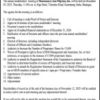Aviva chief executive Dame Amanda Blanc has urged the chancellor to rethink plans for a major clampdown on salary sacrifice schemes, warning that the move would penalise both employers and workers while damaging long-term pension saving across the UK.
Speaking ahead of Rachel Reeves’ 26 November budget, Blanc said Aviva was “very concerned” about the Treasury’s intention to cap the amount workers can sacrifice tax-free to just £2,000 a year — a change expected to raise around £2 billion annually.
Salary sacrifice allows employees to give up part of their gross pay in return for pension contributions or other benefits. Because the contribution is taken before tax and national insurance (NI), both individuals and employers save on NI payments. At present, workers can contribute up to £60,000 a year into pensions tax-free under the system.
But pensions experts warn that Reeves’ proposed cap would sharply increase NI bills for employers and employees, likely leading many companies to reduce the generosity of their pension contributions.
“What you’re effectively doing is penalising those employers that actually contribute more to employees’ pensions,” Blanc said. “And you’re also signalling to people who save for their pension that perhaps they shouldn’t do it. That is bad news long-term for the UK, particularly when 15 million people are already not saving enough for retirement.”
The move would also represent a second NI blow for businesses in just over a year. Reeves increased employer NI in her first budget last October — a decision that drew strong criticism from business leaders.
Blanc warned that removing the NI benefit entirely would impose a meaningful cost on firms: “The actual cost to employers of removing that NI benefit from salary sacrifice is not going to be insignificant.”
Her comments came as Aviva delivered a strong third-quarter update. The FTSE 100 insurer said it now expects to realise £225 million in annual cost savings from its £3.7 billion acquisition of Direct Line — almost double the £125 million previously forecast — by 2028.
Aviva also expects to generate operating profit of £2.2 billion this year, excluding any contribution from Direct Line. That means the company is set to hit its 2026 profit target two years early. It also unveiled new three-year goals, including delivering a return on equity of more than 20% by 2028.
Analysts at Bank of America reiterated their “buy” rating on Aviva, saying they expect the insurer to beat its newly updated financial targets.
Despite the strong guidance, Aviva shares fell 42.5p — down 6.1% — to close at 650p. The stock has risen around 40% since the start of the year, with analysts suggesting that many of the upgrades announced on Thursday had already been priced in by investors.


















